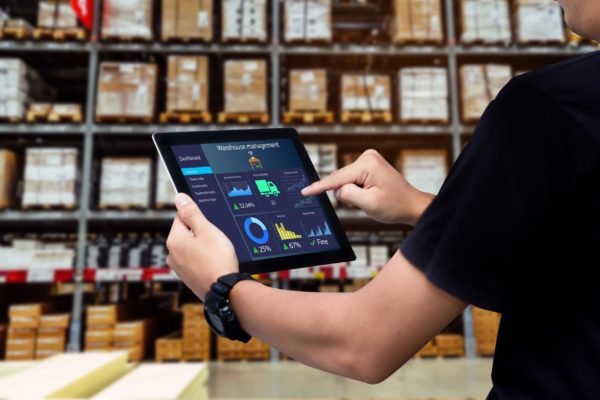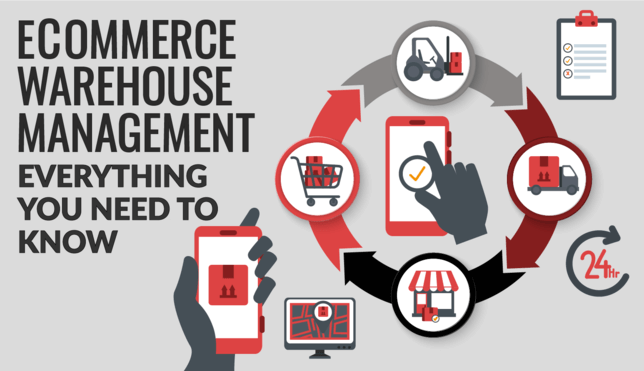This is the complete guide to eCommerce warehouse management systems.
In it, you’ll learn:
- What eCommerce is
- What eCommerce warehouse management systems are
- How to choose the right system for you
- The 11 best eCommerce warehouse management systems
Let’s dive in!
What is eCommerce?
eCommerce involves buying and selling products and services over the web.
Consumers shop at retailers’ websites and place their orders using electronic payment methods.
The retailer then ships the goods to the buyer’s location.
Or, in the case of non-physical products, the order is fulfilled immediately.
Some well-known eCommerce companies include:
- Amazon
- Alibaba
- JD.com
- Shopify
- eBay
- Walmart
- Rakuten
What Does Warehouse Management Involve?
Warehouse management involves organizing and controlling operations within a warehouse.
This includes:
- Hiring and training staff
- Maintaining equipment
- Keeping track of inventory
- Fulfilling orders
Since these tasks can be complex, many warehouses use software to manage their processes.
What’s an eCommerce Warehouse Management System?
eCommerce retailers use warehouses to store physical goods sold on their online platforms.
An eCommerce warehouse management system (WMS) uses software to manage and control warehouse operations.

For example, these systems can handle tasks ranging from:
- Receiving goods
- Managing inventory
- Ensuring order fulfillment
- Allocating labor
These systems can be integrated with other software as well.
For instance, a warehouse management system can work with maintenance software.
So, warehouse managers can keep tabs on equipment, like forklifts.
eCommerce Platforms vs. eCommerce Warehouse Management Systems: What’s the Difference?
You might be wondering: What’s the difference between an eCommerce platform and an eCommerce warehouse management system?
An eCommerce platform handles the selling and marketing of products and services.
This is done on the “front-end.”
And that simply means it’s the part of the website that customers actually interact with.
For example, a Shopify storefront is an eCommerce platform.

A web visitor lands on the site, browses the inventory, and places their order.
An eCommerce warehouse management system, on the other hand, deals with inventory management and fulfillment.
This takes place on the “back end.”
In other words, that’s where the goods are physically kept and shipped to customers.
Take our Shopify example again.
Once a customer places their order, it must be fulfilled.
And the fulfillment process happens in the warehouse where their goods are stored.

The warehouse’s eCommerce warehouse management system helps keep track of the order and direct its fulfillment.
What Are the Benefits of Using an Ecommerce Warehouse Management System?
There are many ways warehouses can benefit from using an eCommerce warehouse management system.
Here are just a few.
Better Inventory Management
An eCommerce WMS lets you manage inventory in real-time.
You can track data about the latest orders, shipments, or any other activity on your inventory.
And this can help reduce errors and cut costs in the process.
Reduced Costs
A robust eCommerce WMS reduces the overall costs of operations.
For one, you can save a considerable amount of space once you install a WMS.
Furthermore, these systems can streamline the packing and picking process, minimizing errors.
It can also help allocate labor most efficiently.
Better Order Accuracy
An eCommerce WMS helps you identify and rectify errors before they occur.
For instance, you can integrate your WMS with a voice picking system.

That way, you can take the guesswork out of picking orders.
And in the process, workers will make fewer errors.
So the result is twofold: Lower costs and happier customers.
How to Choose an eCommerce Warehouse Management System
Selecting an ideal eCommerce WMS can be a daunting task.
You may have heard that expensive warehouse management systems produce the best results.
But apart from the price, there are several other crucial factors that you must consider.
Let’s check them out.
Integration
Consider a WMS that merges with the existing software in your warehouse.
That includes things like enterprise resource planning (ERP) and maintenance software.
Otherwise, you’ll have to navigate multiple systems that don’t communicate with each other.
And that will compound errors and reduce efficiency.
Ease of Use
It’s best to go for a WMS that can be easily understood and used by all workers within your warehouse.
Otherwise, complicated systems will put a drain on your resources.

That includes spending extra time and money on training and implementation.
Accuracy
Consider only warehouse management systems that are 99.99% accurate.
One of the best ways to determine this is to request a demo from the vendor.
After all, demos give you first-hand experience before you spend your money.
Scalability
eCommerce is always changing.
So, consider a WMS that will grow with your business.
Many of these services offer packages designed for smaller businesses.
But as you grow, they should accommodate that growth.
Return on Investment
With the right WMS, you can cut costs and maximize profits for your eCommerce business.
But with the wrong one, you can end up spending more than you save.
So make sure you conduct a thorough analysis of the costs versus the benefits.
Data
Does the system allow you to access real-time data whenever needed?
The best WMS for you will.
For example, many warehouse management systems can be accessed from smartphones.

And for busy warehouse managers constantly on the move, this flexibility may be important.
11 Best eCommerce Warehouse Management Systems
You now know what eCommerce warehouse management systems are and how to choose the best one.
So, let’s cover the top 11 vendors of these systems.
Skubana
![]()
Skubana is an eCommerce warehouse management software that handles inventory and stock management.
It integrates eCommerce products, sales channels, and fulfillment centers.
Not only that, but Skubana also provides predictive analytics to give you valuable data.
And you can use that data for forecasting your growth with confidence and clarity.
For flexibility, Skubana can integrate with the world’s leading eCommerce 3PLs, partners, and marketplaces.
What’s also great about Skubana is that it accommodates large and small operations.
And their budget is flexible depending on the nature of your business.
Ordoro

Ordoro is an all-in-one platform designed for growing merchants.
It can handle dropshipping and streamline your fulfillment workflows.
It also automates processes like bulk shipping labeling and omnichannel inventory management.
The system even creates branded packing lists and shipping labels for your products.
Best of all, these processes occur within a couple of clicks.
Moreover, it allows you to keep your orders in order the moment you import products into the system.
Overall, it’s a good option for growing businesses.
SkuVault

SkuVault is a cloud-based inventory management software.
It allows you to manage inventory, organize warehouses, and connect your sales channels.
The platform integrates with the major eCommerce solutions, such as:
- Amazon
- Walmart
- eBay
- Shopify
- Bigcommerce
- Magento
- Square
SkuVault is a good option for growing corporations.
And they have plans regardless of the stage of your eCommerce business.
Descartes
![]()
Descartes is well-known by direct-to-consumer brands and high-growth online companies.
Descartes’ strength is in maintaining accurate inventory.
To do this, it has an Android application for easy access to real-time data from anywhere, anytime.
It also has a customizable dashboard to align your team with your organization’s goals.
Overall, it’s a strong product for both small and large eCommerce warehouses.
Anchanto

Anchanto is a WMS designed for various companies.
They include:
- eCommerce distributors
- B2B logistic companies
- Warehousing and fulfillment service providers
Anchanto can integrate with 41+ eCommerce platforms and marketplaces.
It allows you to access real-time customer, order, and inventory data.
And it has an Android application for delivery tracking.
Overall, it’s best suited for any sized business.
In fact, global players like Nestle, Luxasia, Garnier, and L’OREAL use Anchanto.
Plus, it offers customized pricing depending on the size of your eCommerce business.
Odoo

Odoo is an all-in-one eCommerce inventory management system.
It has several applications that cover sales, productivity tools, websites, and operations.
Odoo’s WMS software has automated RFQs and order points to automate your supply chain.
Plus, the platform integrates with third-party integrations through Zapier.
Overall, it’s a cost-effective WMS that suits the needs of all companies.
And it’s one of the most budget-friendly applications in the market.
HighJump

If you have a complex supply chain, then look no further than HighJump.
It has several capabilities for growing and complex eCommerce corporations.
So, if you own a growing business or a large warehouse, you may want to consider HighJump.
The software also integrates with major ERPs, including:
- Netsuite
- Acumatica
- SAP Business One
- Oracle ERP
Furthermore, you can get customized integration services depending on your current software.
NetSuite

NetSuite is an eCommerce inventory management software with built-in eCommerce marketing tools.
It’s a cloud-based all-in-one ERP system.
With NetSuite, you can manage inventory, finance, cash flow, and payroll in one platform.
Among the powerful tools integrated into the platform is SuiteCommerce.
This tool is ideal for managing any eCommerce business, whether big or small.
You can get a free demo of the NetSuite software.
And their pricing is available upon request.
SphereWMS

SphereWMS is designed for accurate tracking of warehouse inventory.
It has a dashboard that allows you to access inbound, outbound, and inventory details.
Through this, you can gain visibility and control of all your warehouse operations.
It also provides real-time reports and web visibility.
Furthermore, Sphere integrates with major platforms like Amazon, Blue Cherry, ClickFunnels, and BigCommerce.
And it’s suitable for both large and small warehouse operations.
Infoplus

Infoplus is designed for high-volume growth.
It has inbound and purchasing, custom reporting, and inventory control.
It also has a customer dashboard, real-time shipment, and order tracking.
Additionally, Infoplus WMS works with various-sized businesses.
But it’s particularly well-suited for small and mid-size B2C and B2B businesses.
Their pricing plans are also very flexible, depending on the nature of your business.
They have a variety of options for startups and small businesses too.
You can access pricing on their website.
Manhattan Associates

Manhattan Associates is a warehouse shipping software.
It offers deep supply chain and warehouse management services.
It incorporates point of sale, store fulfillment, clienteling, and enterprise inventory fulfillment.
The product has advanced software that integrates with major ERP systems.
They include Microsoft D365, SAP S/4HANA, among other systems.
Overall, it suits omnichannel, grocery, food, retail, and beverage companies.
Their pricing is also available upon request.
Visit Manhattan Associates’s Website
Conclusion
There you have it: The complete guide to eCommerce warehouse management.
